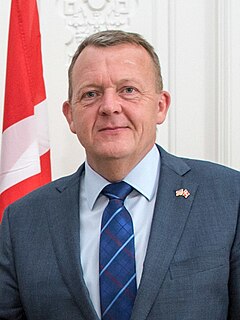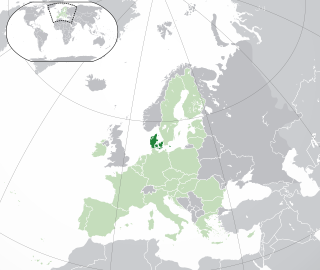 |
|---|
| This article is part of a series on the politics and government of Denmark |
|
|
A referendum on changing the Danish Act of Succession, the rules governing the succession to the Danish throne, was held in Denmark, the Faroe Islands, and Greenland on 7 June 2009, simultaneously with the election to the European Parliament, in Denmark proper. [1]
The Danish Act of Succession of 27 March 1953 was accepted after a 1953 referendum in Denmark and dictates the rules governing the line of succession to the Danish throne. The 1953 referendum changed the act so that it became possible for a woman to inherit the throne in the event that she has no older or younger brothers, a system known as male-preference cognatic preference primogeniture. As the reigning King Frederick IX had three daughters and no sons, this meant that Princess Margrethe became the heir presumptive instead of her uncle Prince Knud. As Frederick IX's wife Ingrid of Sweden was not expected to have any more children, this effectively ensured that Princess Margrethe would become Queen of Denmark, which she did.

Denmark, officially the Kingdom of Denmark, is a Nordic country and the southernmost of the Scandinavian nations. Denmark lies southwest of Sweden and south of Norway, and is bordered to the south by Germany. The Kingdom of Denmark also comprises two autonomous constituent countries in the North Atlantic Ocean: the Faroe Islands and Greenland. Denmark proper consists of a peninsula, Jutland, and an archipelago of 443 named islands, with the largest being Zealand, Funen and the North Jutlandic Island. The islands are characterised by flat, arable land and sandy coasts, low elevation and a temperate climate. Denmark has a total area of 42,924 km2 (16,573 sq mi), land area of 42,394 km2 (16,368 sq mi), and the total area including Greenland and the Faroe Islands is 2,210,579 km2 (853,509 sq mi), and a population of 5.8 million.

The Faroe Islands, or the Faeroe Islands—a North Atlantic archipelago located 200 miles (320 km) north-northwest of the United Kingdom and about halfway between Norway and Iceland—are an autonomous country of the Kingdom of Denmark. Total area is about 1,400 square kilometres (540 sq mi) with a population of 50,322 in October 2017.
Contents
- In parliament
- Relation to constitution
- Skepticism from opposition
- Prognosis for referendum
- Campaign and positions
- Results
- References
The law, which passed with 85.4% of the popular vote, [2] eliminates male-preference primogeniture in favour of absolute primogeniture, resulting in sons losing precedence over daughters in the line of succession. The law did not affect anyone in the line of succession at the time of the referendum: the Queen's two children are both male, as is the Crown Prince's eldest child, born in 2005. However, had the referendum not been successful, Prince Vincent, who was born in 2011, would have been higher in the line of succession than Princess Isabella, born in 2007.

Margrethe II is the Queen of Denmark, as well as the supreme authority of the Church of Denmark and Commander-in-Chief of the Danish Defence. Born into the House of Glücksburg, a royal house with origins in Northern Germany, she was the eldest child of Frederick IX of Denmark and Ingrid of Sweden. She succeeded her father upon his death on 14 January 1972, having become heir presumptive to her father in 1953, when a constitutional amendment allowed women to inherit the throne. On her accession, Margrethe became the first female monarch of Denmark since Margrethe I, ruler of the Scandinavian kingdoms in 1375–1412 during the Kalmar Union. In 1967, she married Henri de Laborde de Monpezat, with whom she has two sons: Crown Prince Frederik and Prince Joachim. She has been on the Danish throne for 47 years, becoming the second-longest-reigning Danish monarch after her ancestor Christian IV.

Frederik, Crown Prince of Denmark, Count of Monpezat, is the heir apparent to the throne of Denmark. Frederik is the elder son of Queen Margrethe II and the late Henrik, Prince Consort.

Prince Christian of Denmark, Count of Monpezat is the eldest child of Crown Prince Frederik and Crown Princess Mary. He is a grandson of Queen Margrethe II and her husband, the late Prince Henrik. He is second in the Danish line of succession, after his father.










